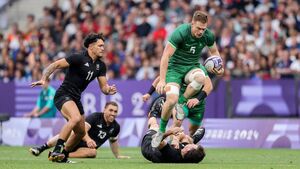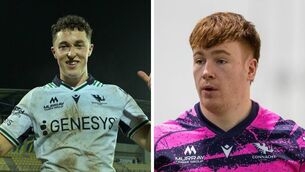IRFU fails to see the big picture in Sevens

Ireland’s Zac Ward charges past Leroy Carter of New Zealand during the 5th/6th playoff in the Men’s Rugby Sevens at the Paris 2024 Olympic Games in the Stade de France. Picture: INPHO/Dan Sheridan
They came in their thousands, clad in blue and black and red and white, voices echoing through the streets of Dublin 4. For one night in May, Dublin was the centre of European football. But the 2024 UEFA Europa League Final between Atalanta and Bayer Leverkusen wasn’t just a spectacle on the pitch, it was an economic and cultural bonanza.
According to the FAI’s impact report, which was prepared by EY and published last week, the match generated over €17 million in Gross Value Added (GVA) to the Irish economy. More than 25,000 international fans descended on the capital, packing out hotels, filling bars and queuing at food trucks in fan zones from Shelbourne Park to Dublin Castle. The event supported almost 300 full-time equivalent jobs, and if that wasn't enough to make the bean-counters beam, the game itself reached 49.5 million TV viewers worldwide and racked up a staggering 189 million social media impressions.
It was, by all accounts, a roaring success – and not just because local businesses did a tidy trade. It showed what’s possible when sport is viewed not as a cost centre, but as a vehicle for tourism, jobs and economic activity.
And yet, the IRFU seems to be still locked in the mahogany-walled clubhouse boardroom of the past, still squinting at modern sport through foggy bifocals. While football is thinking big, rugby is thinking smaller. Much smaller. The decision to axe the men’s Sevens programme, coming just months after the team booked their place at the Paris Olympics, is the kind of move that smacks of retrenchment. Rather than following the FAI’s lead and attempting to have Dublin host a leg of the Sevens Series, the IRFU has pulled the plug on the programme entirely. It was a decision that reeked of conservatism.
Just as the FAI are waving to the rest of the world asking them to come over, the IRFU turned off the lights and drew the curtains.
In defence of its decision, the alickadoos pointed to the bottom line. In November, the IRFU reported an €18 million deficit for the 2023/24 season, the kind of financial haemorrhage that tends to trigger red pens and sharp pivots. Something had to give, and that something, apparently, was the men’s Sevens programme.
In the statement accompanying the decision, High Performance Director David Humphreys spoke of a “difficult” decision and the need to focus resources on areas “that will have the greatest impact”. It was concluded that the programme no longer justified itself as a player pathway to the 15s game.
The women’s Sevens, on the other hand, lives to fight another day, seen as an essential stepping stone for the women’s 15s game, which is still growing its roots and structures. In other words: if it feeds the 15s beast, it’s in. Otherwise, thanks for your service.
And that's the crux of the issue. The Sevens programme should never have been just a feeder system. It should never have been just a holding pen for out-of-favour wingers or a halfway house for academy talent trying to prove themselves. It was, and should still be, a code in its own right.
To judge Sevens solely by how many players it churns out for the provinces is to misunderstand its true value entirely. It’s like assessing the value of the Abbey Theatre based on how many Hollywood stars it produces – a narrow lens applied to a broad canvas.
David Nucifora, the man who drove the creation of the men’s Sevens programme during his time as IRFU High Performance Director, didn’t mince words in response to the decision. “Short sighted nonsense,” he called the decision, stating that it was “gut-wrenching” to see the project dismantled.
It wasn’t a passing gripe. This was the architect speaking as the house was being torn down.
“The lack of vision and leadership being shown is also a major concern for Irish rugby,” he added.
He was responding to a Facebook post belonging to David Barry, owner of Major League Rugby's New England Free Jacks and the key financial backer of the programme. He, too, had been blindsided. No consultation. No phone call. Just a line drawn through years of investment and belief.
What makes the decision all the more galling is that Ireland wasn’t just cutting something that wasn’t working – it was stepping away from something that was just beginning to thrive. The men’s Sevens side had drawn in new Irish fans at last year's Olympic Games. They weren’t languishing. And yet, instead of building on that momentum, the IRFU reached for the scissors.
Elsewhere, Sevens is treated as a global product in its own right. The USA see it as a gateway to new fans. Fiji have built a dynasty around it. The Sevens Series touches down in cities like Dubai, Hong Kong, Singapore, Vancouver and Los Angeles. None of them boast Ireland’s rugby heritage. And yet Dublin has never experienced a Sevens weekend.
It’s not as though the city lacks the facilities. It has a globally renowned rugby stadium within walking distance of the city centre, a buzzing hospitality sector and the potential to deliver a marvellous atmosphere in the stadium and the city over a jubilant weekend. The Sevens Series has also visited every other home nation, which should be an added source of shame for the union. There was no lack of ambition when aiming to host the Rugby World Cup which, in hindsight, was too lofty a notion given the country’s lack of appropriate infrastructure. Hosting a leg of the Seven Series would've been a much more sensible and achievable pursuit – if the will was there.
And it’s not as if the model needed to be invented from scratch: the FAI just demonstrated how it’s done, with cold, hard numbers attached.
Instead, Irish Rugby blinked. It looked at a global platform and saw a budget line. It looked at an opportunity for growth and decided the safest bet was to shrink.



